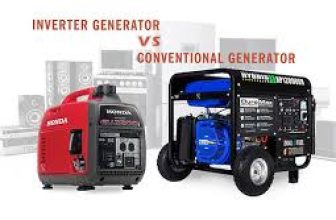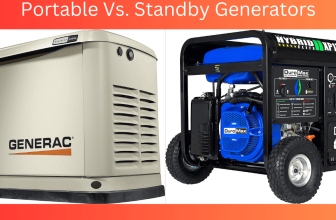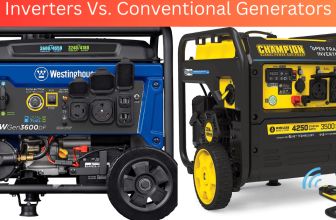Standby Or Portable: Which Generator Suits Your Needs?
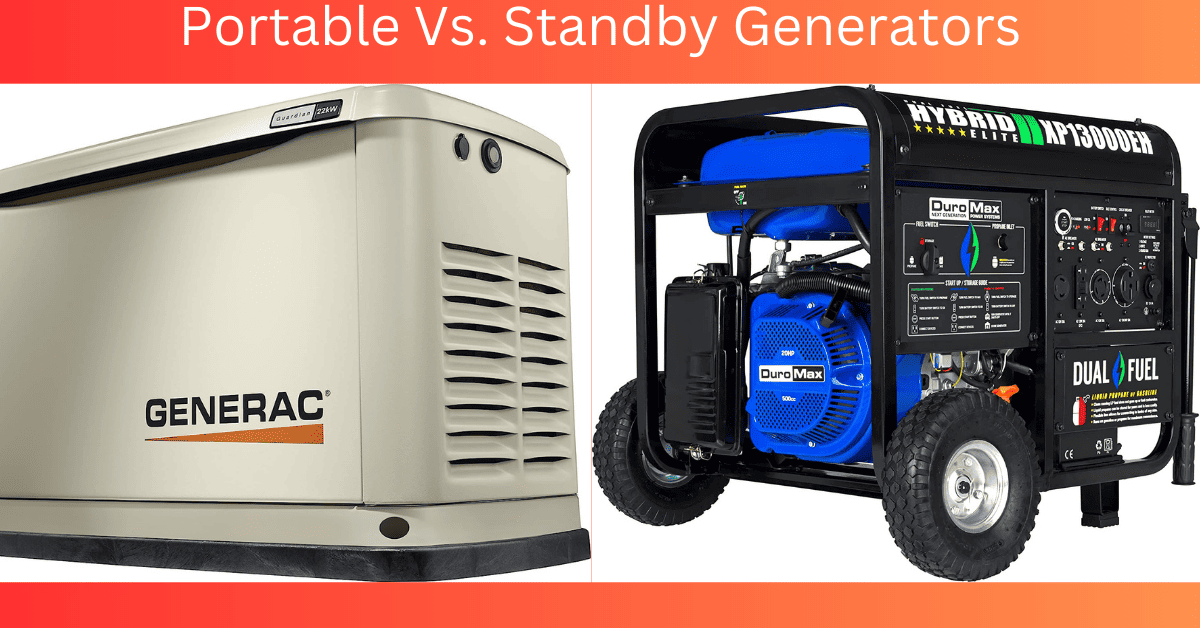
As homeowners, we all want to be prepared for power outages and unforeseen emergencies. That’s where generators come in handy. However, with so many options available in the market, it can be challenging to choose the right one for our needs.
Should we opt for a standby or portable generator? In this article, we’ll explore the differences between the two types of generators and help you understand which one would be a better fit for your home. By the end of this article, you’ll have a clear idea of the benefits, features, and considerations that come with each type of generator.
So, let’s dive in and find out which generator suits your needs!
Key Takeaways
- Standby generators are permanently installed and provide backup power during a power outage, while portable generators are movable and used for temporary power outages or outdoor activities.
- Standby generators have a higher power output and run on natural gas or propane, while portable generators are usually powered by gasoline or propane and are more versatile and affordable.
- When choosing a generator, factors to consider include intended use, required power output, and fuel efficiency.
- Regular maintenance and hiring a professional for installation and upkeep are essential for the proper functioning and lifespan of a generator.
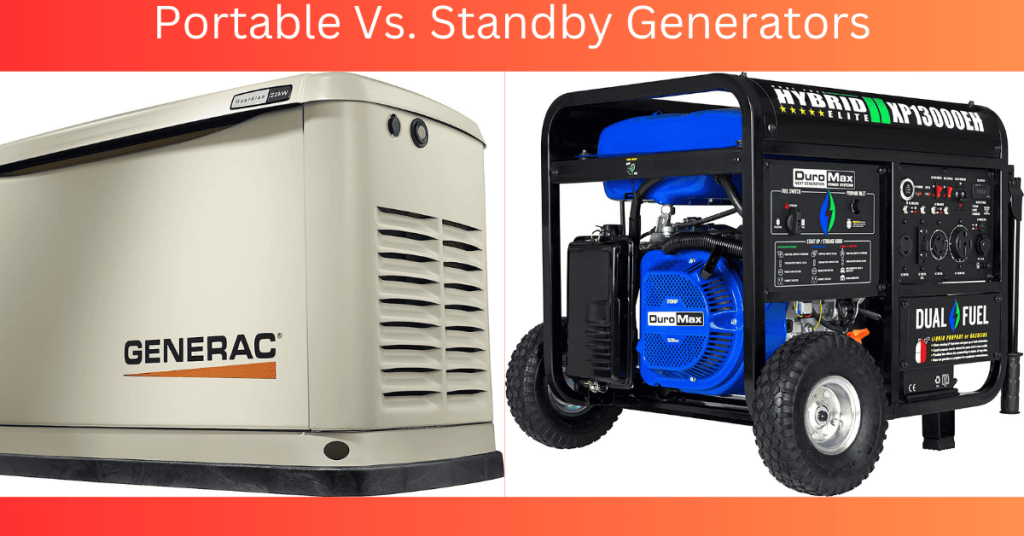
Understanding the Differences Between Standby and Portable Generators
If you’re trying to decide between a standby or portable generator, it’s important to understand the differences between the two options.
Portable generators are designed to be moved around and are typically used for temporary power outages or outdoor activities. They are smaller and lighter than standby generators, making them easier to transport.
Standby generators, on the other hand, are permanently installed and provide backup power during a power outage. They are larger and can power an entire home or business, depending on their capacity.
One major difference between these two types of generators is their power capacity. Portable generators typically have a lower power output, ranging from 1,000 to 10,000 watts, while standby generators can provide between 5,000 and 150,000 watts of power. This means that if you need to power your entire home or business during an outage, a standby generator is the better option. However, if you only need to power a few appliances or devices, a portable generator may be sufficient.
Another difference is their fuel source. Portable generators are usually powered by gasoline or propane, while standby generators run on natural gas or propane. Natural gas is typically more reliable and easier to obtain than gasoline, which can be a consideration during a prolonged power outage. Additionally, standby generators often have automatic transfer switches, which can detect when there is a power outage and automatically switch on the generator.
Understanding the differences between standby and portable generators is crucial when deciding which one is right for you. While portable generators are great for temporary power outages or outdoor activities, standby generators are the best option for providing backup power to your entire home or business.
In the next section, we’ll delve into the benefits of a standby generator and what makes them a worthwhile investment.
Benefits of a Standby Generator
You’re probably familiar with the feeling of relief that comes with knowing that you have a backup plan when unexpected situations arise. This is exactly what a standby generator can provide for you.
Unlike portable generators, standby generators are permanently installed outside your home, and they’re connected to your electrical system. This means that they can automatically turn on when there’s a power outage, providing you with continuous power to keep your appliances running and your home secure.
One of the main benefits of a standby generator is that they’re extremely reliable. They’re designed to start up automatically, so you don’t need to worry about manually starting them up and connecting them to your home’s electrical system. Additionally, since they’re permanently installed, you don’t need to worry about storing them or transporting them when you need them. This makes them an ideal choice for homeowners who don’t want to deal with the hassle of setting up a generator during a power outage.
If you’re someone who wants peace of mind knowing that you have a reliable backup power source, then a standby generator is definitely the way to go. However, if you’re looking for a more portable solution, then a portable generator might be a better fit for you.
In the next section, we’ll discuss the benefits of a portable generator and help you decide which option is best for your needs.
Benefits of a Portable Generator
When the power goes out unexpectedly, having a backup plan can be a lifesaver, and that’s where a portable generator comes in handy. Unlike standby generators, which are permanently installed, portable generators can be moved around as needed. This makes them ideal for camping trips, outdoor events, and emergency situations.
One of the biggest benefits of a portable generator is its versatility. Most models are designed to power a variety of appliances and electronics, from refrigerators and air conditioners to laptops and cell phones. This means you can stay connected and comfortable even during a power outage. Plus, since portable generators are typically smaller and lighter than standby generators, they’re easier to store and transport.
Another benefit of a portable generator is its affordability. While standby generators can cost thousands of dollars to install, portable generators are much more budget-friendly. In fact, you can find a high-quality portable generator for a few hundred dollars. This makes them a great option for homeowners on a tight budget who still want the peace of mind that comes with having backup power.
When it comes to choosing a generator, there are many factors to consider. From power output and fuel type to noise level and safety features, it’s important to choose a model that meets your specific needs. By weighing the pros and cons of different types of generators, you can select the one that’s right for you and your family.
Factors to Consider When Choosing a Generator
Before making a decision on a generator, it’s crucial to carefully evaluate various factors such as the intended use, required power output, and fuel efficiency, in order to ensure that the investment is worth every penny.
Firstly, consider the intended use of the generator. Will it be used for outdoor camping trips or as a backup power source for your home during power outages? The intended use will determine the size and type of generator you need.
Secondly, determine the required power output of the generator. This will depend on the appliances or electronics you plan to power. Make sure to choose a generator that can handle the combined wattage of all the devices you need to use. You can calculate the total wattage by adding up the wattage of each device.
Lastly, fuel efficiency is an important factor to consider. A generator that is fuel-efficient will save you money in the long run and is better for the environment. Consider the type of fuel the generator uses and how long it can run on a tank of fuel.
Considering these factors will help you make an informed decision on which generator suits your needs.
Next, we’ll discuss the installation and maintenance requirements of generators to help you make an informed decision.
Installation and Maintenance Requirements
When it comes to installation and maintenance requirements for generators, there are a few key points to consider.
First, you need to decide if you want to hire a professional or do it yourself.
Second, regular maintenance is essential to ensure your generator operates at peak performance.
Lastly, upkeep is necessary to extend the lifespan of your generator and prevent expensive repairs down the line.
At our company, we always recommend consulting with a professional to ensure safe and proper installation and maintenance of your generator.
Hiring a Professional vs. DIY
Opting to hire a professional instead of trying to do it yourself will add an extra level of assurance that your generator installation will be done correctly. While DIY projects can be fulfilling, installing a standby or portable generator can be complicated, and if not done correctly, can lead to serious safety hazards. Hiring a professional can save you time, money, and most importantly, give you peace of mind that your generator is installed correctly and safely.
Here is a table that outlines the differences between hiring a professional and doing it yourself:
| Hiring a Professional | Doing it Yourself |
|---|---|
| More expensive upfront | More affordable |
| Guaranteed quality work | No guarantee of quality work |
| Saves time and effort | Requires more time and effort |
| Liability coverage | No liability coverage |
| Professional expertise | Limited expertise |
With this information in mind, it’s important to weigh the pros and cons of each option and decide which one is best for your specific situation. Once the installation is complete, it’s important to regularly maintain and upkeep your generator to ensure it continues to function properly.
Regular Maintenance and Upkeep
To ensure your generator functions properly for years to come, it’s crucial to regularly maintain and upkeep it. This means checking the oil levels, cleaning the air filter, and inspecting the spark plug. It’s important to follow the manufacturer’s recommended maintenance schedule and to replace any worn or damaged parts promptly. Neglecting regular maintenance can lead to generator failure and costly repairs or replacements.
Regular maintenance not only prolongs the life of your generator, but it also ensures that it operates safely. A poorly maintained generator can emit dangerous fumes, pose a fire risk, or cause electrical shock. By keeping your generator in top condition, you can avoid these potential hazards and use it with peace of mind.
Now, let’s take a look at some safety considerations to keep in mind when operating your generator.
Safety Considerations
As we consider the safety implications of using generators, there are three key areas that we need to pay close attention to: carbon monoxide emissions, electrical hazards, and fuel storage and handling.
Carbon monoxide is a colorless, odorless gas that can be produced by generators and can be deadly if inhaled in high concentrations.
Electrical hazards, such as electrocution or shock, can arise from improper grounding or use of extension cords.
Finally, fuel storage and handling can pose a risk of fire or explosion if not handled properly.
As we explore the use of generators, it’s important to keep these safety considerations in mind.
Carbon Monoxide Emissions
Beware of the invisible danger lurking in your generator usage – carbon monoxide emissions can be deadly if proper precautions aren’t taken. This odorless and colorless gas is produced when fuel is burned, and it can build up quickly in enclosed spaces.
To ensure your safety and that of your loved ones, here are three things you should keep in mind when using a generator:
- Always operate your generator in a well-ventilated area, preferably outdoors, and at least 20 feet away from any windows, doors, or vents.
- Invest in a carbon monoxide detector and place it near your sleeping area. This will alert you if levels of the gas become dangerous.
- Do not use a generator inside your home, garage, or any other enclosed space, even if you have windows or doors open. Carbon monoxide can still accumulate and cause harm.
Remember, even a small amount of carbon monoxide can be deadly. So take these precautions seriously to avoid any tragedy.
As important as it is to be mindful of carbon monoxide emissions, it’s also essential to be aware of the electrical hazards associated with generator use.
Electrical Hazards
Watch out for the potential danger of electrical hazards when using a generator, as improper use and handling can lead to serious injury or even death. When operating a generator, make sure to read the manual carefully and follow all safety guidelines.
Always use a grounded extension cord and keep the generator away from any standing water or wet surfaces. Additionally, never touch the generator or its plug with wet hands or while standing in water. Keep the generator in a well-ventilated area and never use it indoors or in enclosed spaces, as this can lead to carbon monoxide poisoning.
By following these safety guidelines, you can ensure that you and your loved ones stay safe while using a generator for temporary power needs.
As we move to the next section about fuel storage and handling, remember that proper use and handling of fuel is just as important as safe generator operation.
Fuel Storage and Handling
To ensure your safety and the longevity of your equipment, it’s crucial to properly store and handle fuel when using a generator. When it comes to fuel storage, there are some important factors to consider. Firstly, it’s essential to choose the right container. A sturdy, approved container with a tight-fitting cap is ideal. Secondly, it’s important to store the container in a cool, dry place away from any potential sources of ignition such as a furnace or a gas water heater. Lastly, label the container with the type of fuel it contains and the date it was filled to ensure that you don’t use stale fuel in your generator.
Handling fuel is just as important as storing it. When fueling your generator, make sure it’s turned off and cool before adding fuel. Also, avoid spilling fuel on the generator or the ground as it can be a fire hazard. If you do spill fuel, clean it up immediately using an absorbent material such as cat litter or sand. Lastly, make sure to dispose of any excess fuel properly. Don’t pour it down the drain or into the ground. Instead, take it to a hazardous waste facility or a local gas station that accepts used fuel. By following these fuel storage and handling tips, you’ll ensure your safety and the longevity of your generator.
| Fuel Storage Tips | Fuel Handling Tips | Fuel Disposal Tips |
|---|---|---|
| Choose a sturdy container with a tight-fitting cap. | Turn off and cool the generator before adding fuel. | Dispose of excess fuel properly. |
| Store the container in a cool, dry place away from potential sources of ignition. | Avoid spilling fuel on the generator or the ground. | Take it to a hazardous waste facility or a local gas station that accepts used fuel. |
| Label the container with the type of fuel and the date it was filled. | Clean up fuel spills immediately. |
Remember, the key to mastering the use of a generator is to pay attention to the small details. Proper fuel storage and handling are just as important as choosing the right generator for your needs. With these fuel storage and handling tips in mind, you’ll be well on your way to safely using your generator for years to come.
Frequently Asked Questions
What is the average lifespan of a standby generator?
You might be thinking that standby generators have a short lifespan, but in reality, they can last up to 20-30 years with proper maintenance. So, investing in a standby generator can provide long-term peace of mind during power outages.
Can a portable generator be used indoors?
No, portable generators should never be used indoors due to the risk of carbon monoxide poisoning. It’s important to always follow the manufacturer’s instructions and use them in a well-ventilated area. Safety first!
How often should a standby generator be serviced?
Did you know that standby generators should be serviced every 200 hours of use or annually? It’s important to keep up with maintenance to ensure your generator is ready when you need it. Let’s talk about how to keep your standby generator in top shape.
Are there any noise restrictions for using a portable generator in residential areas?
Yes, there are noise restrictions for using a portable generator in residential areas. We need to keep the noise level in check as per the local regulations to avoid disturbing our neighbors.
What kind of fuel is recommended for portable generators?
We recommend using gasoline or propane for portable generators. Gasoline is widely available, but propane is cleaner and can be stored for longer periods. Always follow the manufacturer’s instructions and safety guidelines when handling fuel.
Conclusion
So, which generator is right for you? Well, it ultimately comes down to your specific needs and preferences.
If you’re looking for a reliable source of backup power during prolonged outages, a standby generator may be the way to go.
On the other hand, if you’re in need of a portable power solution for outdoor activities or occasional power outages, a portable generator might be the better choice.
Regardless of which type of generator you choose, it’s important to remember that safety should always be your top priority.
Always follow the manufacturer’s instructions for installation, maintenance, and operation, and never use a generator indoors or in an enclosed space.
With a little research and careful consideration, you can find the perfect generator to meet your needs and keep your home or business powered up when you need it most.
Stay safe, and happy generating!



